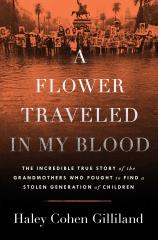Reading Group Guide
Discussion Questions
A Flower Traveled in My Blood: The Incredible True Story of the Grandmothers Who Fought to Find a Stolen Generation of Children

1. A FLOWER TRAVELED IN MY BLOOD is a line from Juan Gelman’s poem titled “Epitaph.” Author Haley Cohen Gilliland chose to title the book after this poem even though it was written long before 1976. Why do you think “Epitaph” was chosen? How does this poem serve as a frame for the story that follows?
2. How does the history provided in Part One help contextualize what led to Jorge Rafael Videla’s rise to power? What does this timeline suggest about the conditions that led to dictatorship and state-sanctioned violence?
3. How does the combination of historical accounts and personal narratives make this book unique --- not only journalism or history, but both? How would your reading be different if the book didn’t include the stories of women like Rosa?
4. This book portrays the Abuelas as simultaneously strong and emotionally affected. Alongside one another, women could feel their grief and get support from others who understood their pain. In what ways were their emotions the driving force for the organization’s efforts? How did these emotions both inspire action and affect connection/community?
5. What role did the news and media play in the Abuelas’ fight for justice? How did these women use it to their advantage? How did their ideological opponents use the media against the Abuelas, and how did they respond?
6. What role did the Argentine Church and other religious organizations play in the search for the missing grandchildren?
7. When the stolen grandchildren reconnected with their biological families, their reunions weren’t always smooth. What are the different factors that made reunion so complicated?
8. Following the end of the dictatorship, the country grappled with how to recover from the brutalities of the past. They asked: Is it best to push forward and forget, or to directly confront past harm? Discuss how efforts on each side of this debate affected the Abuelas and the public at large.
9. How much of this history were you aware of prior to reading this book? How does this new knowledge inform your perspective as a civilian and political subject? Do you find yourself personally inspired or empowered by the strength of the Abuelas?
10. Various locations from this period, such as the ESMA, have been preserved or turned into historical sites. Are these places you would be interested in visiting? Why or why not? What emotions does this idea stir up inside of you?
11. If you had to pick someone from this book to interview, who would it be and why? What questions would you ask them?
12. The Abuelas de la Plaza de Mayo are still fighting to this day to find all of the missing grandchildren and give them the chance to know their real identities. What about their organization has helped them achieve such longevity? What are their strengths and what makes them so powerful in public consciousness?
A Flower Traveled in My Blood: The Incredible True Story of the Grandmothers Who Fought to Find a Stolen Generation of Children
- Publication Date: July 15, 2025
- Genres: History, Nonfiction
- Hardcover: 512 pages
- Publisher: Avid Reader Press/Simon & Schuster
- ISBN-10: 1668017148
- ISBN-13: 9781668017142







